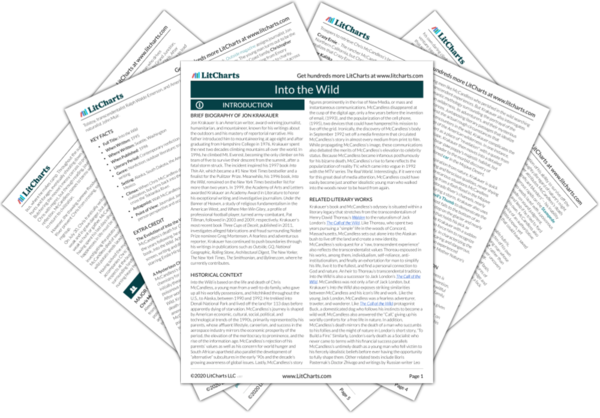Summary
Analysis
Grain elevator operator Wayne Westerberg picks up Chris McCandless, (going by “Alex”), in September of 1990, while driving back to Carthage, South Dakota. Krakauer imagines what Chris would have looked like to Wayne—vulnerable and “hungry.” Westerberg remembers that, at the time of their meeting, McCandless had not eaten for days and had no more money. When they dined at a friend’s house that night, McCandless “wolfed down” the meal and fell fast asleep at the table.
Chris’ journey is plagued by hunger. Starved when he meets Wayne, he demonstrates a hardy, almost wolfish appetite when offered food. However, Chris does not only hunger for food, he also hungers for novel life experiences, like hitchhiking. By pairing Chris’ craving for food with his yearning for adventure, Krakauer suggests that Chris’ desires are extreme, even unsustainable.
Themes
McCandless stays with Westerberg and works on his crew for three days. Wayne is so impressed by “Alex’s” work ethic that he offers him a job.
Chris’ strong work ethic demonstrates his highly principled nature, as well as his growing loyalty towards the father figure of Wayne Westerberg.
Themes
During his second stay, McCandless develops a “lasting bond” with the town and Wayne, becoming a part of a “surrogate family” of workers who live, cook and chase women together as part of an informal co-op. During this time, Wayne also learns from tax records that “Alex’s” real name is actually Christopher.
Chris’ familial attachment to Wayne, Carthage, and the co-op contrasts with the itinerant and lonely lifestyle he leads on the road, illustrating the tension between intimacy and isolation in his life. Chris’ concealment of his identity indicates that he is trying to escape something, that his sense of self is in flux.
Themes
Two weeks after McCandless arrives in Carthage, Westerberg is arrested for stealing satellite TV codes. With Wayne in jail, Chris is left jobless and leaves town earlier than expected, on October 23rd. Before leaving, he gives Wayne a copy of Leo Tolstoy’s War and Peace, inscribed with a directive to “Listen to Pierre,” the novel’s “questing, altruistic, and illegitimately born” protagonist. He continues to write to Wayne and identifies South Dakota as his home.
Like an evangelist espousing the gospel to an atheist, Chris passes on War and Peace to Wayne in the hopes that he will listen to Pierre’s wisdom. Chris identifies with Pierre because they are both idealistic and betrayed by their fathers (Pierre through his illegitimacy; Chris through his father’s affair). He uses the novel to communicate his beliefs to Wayne, whom he deems worthy of receiving his message.
Themes
Get the entire Into the Wild LitChart as a printable PDF.

In spite of McCandless’ claim to South Dakotan heritage, Krakauer reveals that Chris is actually the son of a successful aerospace engineer, Walt, and his business partner-wife Billie. They raised Chris and his younger sister Carine in the affluent D.C. suburb of Annandale, Virginia. Krakauer also discloses that Chris has six half-siblings from Walt’s first marriage.
Chris disguises his well-to-do upbringing by pretending to hail from humble origins. His creation of an alternate identity suggests that Chris is ashamed of his background. By disclosing the nature of Chris’ blended family, Krakauer hints at unrest in Chris’ home.
Themes
Upon his graduation from Emory University, Chris refuses his parents’ offer to pay for law school and to buy him a new car, preferring instead to spend his summer driving his yellow Datsun on a solo, cross-country journey “to disappear for a while.”
By refusing a new car, Chris rejects his parents’ wealth and love (and perhaps the idea that such things should be combined). Keeping his old car, which he bought himself, embodies Chris’ devotion to a simple life; the car also serves as a vehicle of escape from his parents and society.
Themes
After graduation, McCandless mails his final transcript to his parents. After not hearing from him again, Walt and Billie drive down to Atlanta, where they find his apartment available for rent. Back home they find all their letters to Chris returned in a bundle. Having instructed the post-office to hold his mail for a month to throw his parents off his trail, Chris drives westward in his yellow Datsun on a road trip to reinvent himself and discover the wild.
The strategy Chris employs to deceive his parents is not only calculated and cruel to his parents, it is selfish and self-destructive to himself. By sending nothing but his transcripts, Chris ensures that he disappears without a trace, not only shaking his parents’ peace of mind, but also purposely undermining his personal safety net as ventures into the west on his own.
Themes












